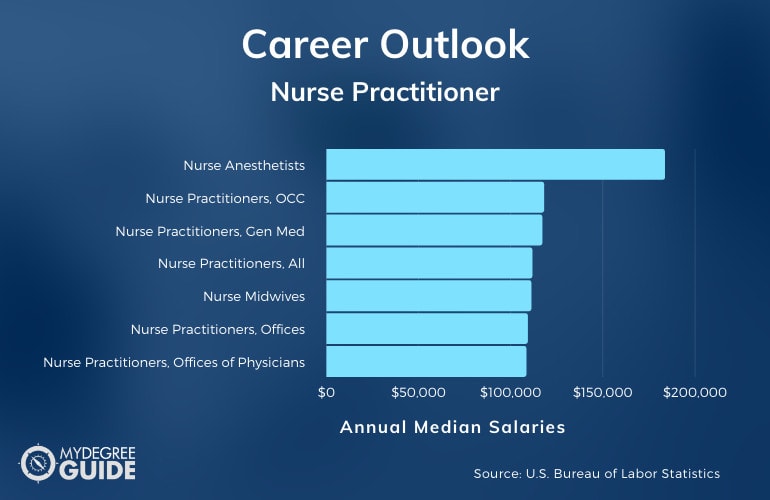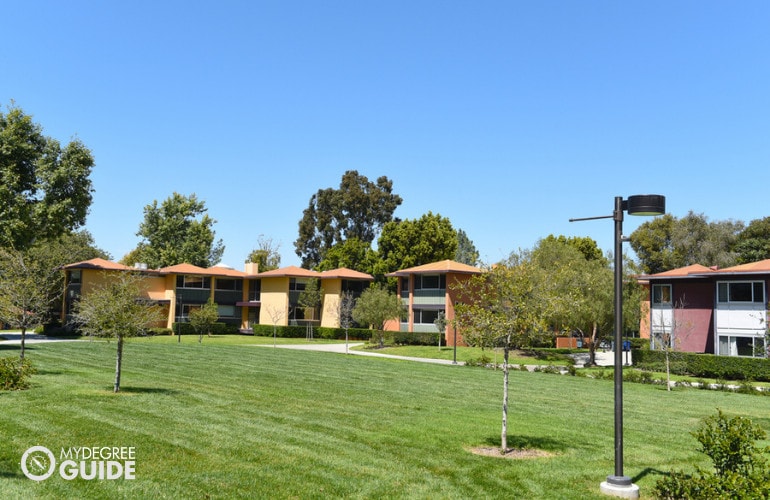If you are looking to advance your career in nursing, RN to DNP programs online are tailored for licensed RNs who want to fast-track their way to the highest degree in nursing.

This bridge program allows you to earn a Doctor of Nursing Practice. With a DNP, you can obtain certification to become an advanced practice registered nurse, depending on your specialization.
Editorial Listing ShortCode:
A DNP online program can also help you qualify for leadership positions in the nursing field. This type of nursing education program focuses on evidence-based practice, administration, and research within the healthcare system.
Universities Offering Online RN to DNP Degree Programs
Methodology: The following school list is in alphabetical order. To be included, a college or university must be regionally accredited and offer degree programs online or in a hybrid format.
Alvernia University
Alvernia University offers an online Doctor of Nursing Practice program for working registered nurses. Admission requires a GPA of 3.0 or higher and 3 letters of recommendation.
During the program, DNP students are expected to complete 1,000 hours of clinical or practicum experience. They may also choose between Primary Care Adult-Gerontology Nurse Practitioner and Family Nurse Practitioner programs.
Alvernia University is accredited by the Middle States Commission on Higher Education.
Azusa Pacific University
Azusa Pacific University offers a Doctor of Nursing Practice. Applicants must submit 2 letters of recommendation.
The program includes “Intensives,” campus experiences that happen once a semester that allow students to interact with faculty and hear guest speakers. At least 1,000 clinical residency hours and 39 to 54 courses are required to graduate.
Azusa Pacific University is accredited by the WASC Senior College and University Commission.
Boise State University
Boise State University offers an online Doctor of Nursing Practice program. DNP students must complete 33 credits and a scholarly project to graduate. Applicants must have a GPA of 3.0 from both their master’s and bachelor’s programs. They must submit a resume, a personal statement, and 3 professional references.
Boise State University is accredited by the Northwest Commission on Colleges and Universities.
Chatham University
Chatham University offers an online DNP program. Students must complete 27 credits and 500 practice hours. Courses last for 15 weeks. The program allows for a 2 day residency on campus. Applicants must have a master’s degree, a GPA of 3.0, and 2 letters of recommendation.
Chatham University is accredited by the Middle States Commission on Higher Education.
Columbia University
Columbia University offers a Doctor of Nursing Practice. The program usually takes 2.5 years to complete. Applicants must have a Bachelor or Master of Nursing, be a registered nurse in NY, and a grade of B or higher in Statistics and Physical Assessment prerequisite courses.
Columbia is accredited by the Middle States Commission on Higher Education.
Drexel University
Drexel University offers a DNP. The program offers 10 week courses four times a year in order to help students graduate faster.
To graduate, students must have 45 credits. Applicants must be registered nurses, have a master’s degree, 2 letters of recommendation, and completion of a graduate-level research course.
Drexel University is accredited by the Middle States Commission on Higher Education.
Duquesne University
Duquesne University offers an online DNP program. Students may choose between two tracks: Clinical Leadership or Executive Nursing Leadership and Health Care Management. Both degree options require 35 credits hours to graduate. To be eligible, applicants must have an RN license and a GPA of 3.0 or higher.
Duquesne University is accredited by the Middle States Commission on Higher Education.
Gardner-Webb University
Gardner-Webb University offers a Doctor of Nursing Practice. Students may choose to specialize in Family Nurse Practitioner, Post Master’s Leadership, or Mental Health Nurse Practitioner. Applicants must have a GPA of 3.0, 2 years as a full-time Registered Nurse, and 3 letters of reference.
Gardner-Webb University is accredited by the Southern Association of Colleges and Schools Commission on Colleges.
Georgetown University
Georgetown University offers a Doctor of Nursing Program. The program can be completed online and requires 74 credits plus 1200 clinical hours to complete. Those interested in the program may be accepted if they are a Registered Nurse with a Bachelor of Science in Nursing.
Georgetown University is accredited by the Middle States Commission on Higher Education.
Idaho State University
Idaho State University offers an online Doctor of Nursing Practice program. Students can choose between the Family Nursing or Psychiatric Mental Health Nurse specializations. Students must complete 78 to 80 credits depending on the specialization chosen. Applicants must have a GPA of 3.0 or higher and be registered nurses.
Idaho State University is accredited by the Northwest Commission on Colleges and Universities.
Kent State University
Kent State University offers a Doctor of Nursing. The program requires 34 credits with at least a B average in all classes to graduate. Students are also required to finish 525 practical hours. Applicants must have a GPA of 3.0 or higher, a registered Nursing License, and GRE scores.
Kent State University is accredited by the Higher Learning Commission.
Liberty University
Liberty University offers an online Doctor of Nursing Practice program. Students must complete 41 credit hours to graduate.
Courses last for 8 weeks, and the program usually takes roughly 2.5 years to complete. Applicants must submit official transcripts within 60 days of the admission decision and must have completed all clinical education prerequisites.
Liberty University is accredited by the Southern Association of Colleges and Schools Commission on Colleges.
Missouri State University
Missouri State University offers a DNP. Students with a master’s degree need to complete 29 credit hours to graduate.
To be eligible for the program, applicants must be registered nurses and should have a GPA of 3.25 from any graduate-level coursework completed. If they do not meet the GPA requirement, all GRE scores should be submitted.
Missouri State University is accredited by the Higher Learning Commission.
Monmouth University
Monmouth University offers an online Doctor of Nursing Practice program. The program requires students to complete 36 credits and a final project that can create a tangible academic product that can impact health care outcomes.
Applicants must have an RN license, a minimum GPA of 3.2, 1 year of professional experience, and 2 letters of recommendation.
Monmouth University is accredited by the Middle States Commission on Higher Education.
Nova Southeastern University
Nova Southeastern University offers an online Doctor of Nursing Practice program. Applicants must have a GPA of 3.0 and 2 reference letters to be eligible.
Students must complete 36 credits and have 500 clinical hours from either the doctorate program or a Master of Science program to graduate. Up to 6 credit hours can be transferred in from another PhD program.
NSU is accredited by the Southern Association of Colleges and Schools Commission on Colleges.
Ohio State University
Ohio State University offers an online program for a Bachelor of Science in Nursing to a Doctorate in Nursing Practice.
The online DNP program offers a specialization in Neonatal Nursing. At least 72 credit hours and a final project are needed to graduate. Applicants must have an active Registered Nursing license, a minimum GPA of 3.0, and 3 letters of recommendation.
The Ohio State University is accredited by the Higher Learning Commission.
Quinnipiac University
Quinnipiac University offers a Doctor of Nursing Practice. Students must complete 30 credits. Students can specialize in Nursing Leadership or Care of Populations. To be eligible for the program, applicants must have a minimum GPA of 3.0, 2 recommendations, all transcripts, 1,000 hours of field work, and a background check.
Quinnipiac is accredited by the New England Commission of Higher Education.
University of Arizona
The University of Arizona offers a Doctor of Nursing Practice. Students may choose one of seven specialties to add to their degree.
The program can usually be completed in 2.5 years. Applicants must have an RN license. If the applicant has a Bachelor of Science, they must have a GPA of 3.0, while those with a Master of Science must have a GPA of 3.5.
The University of Arizona is accredited by the Higher Learning Commission.
University of Cincinnati
The University of Cincinnati offers a Doctor of Nursing Practice. Students can choose between 6 specialties.
To graduate, students must complete 3 practicum courses and a capstone project. Applicants must have an RN license with a year of experience, a GPA of 3.25 or higher, and at least 3 references. Applicants also have to undergo an interview with faculty members.
The University of Cincinnati is accredited by the Higher Learning Commission.
West Virginia University
West Virginia University offers an online DNP program. Students must complete 11 courses to obtain the 32 credits required to graduate. Applicants must have a GPA of 3.0 and an RN license. The submission process is based on the applicant’s overall GPA, past work experience, and professional recommendations.
West Virginia University is accredited by the Higher Learning Commission.
RN to DNP Programs Online

RN to DNP programs prepare nurses for the rapidly changing and fast-paced healthcare industry by fast-tracking their learning and qualifications.
By building on your knowledge and experience as a registered nurse, you can amplify your collaboration skills and leadership qualities through this intensive bridge program. The following are a few potential benefits to entering a DNP degree program:
- New job opportunities. A DNP can open opportunities to become an administrative or practice leader in your hospital.
- Higher earning potential. Holding a doctorate degree can often increase your salary by a significant amount.
- Broader field of interest. A DNP can allow you to broaden your field of interest as you become qualified to work in a wider range of work settings with more responsibilities.
- Ability to impact the healthcare industry. A DNP may assist you in influencing policies, rules, and regulations in the industry.
Some of the topics you’ll study when pursuing a DNP degree program will typically relate to theory, trend and data statistics and future research, health systems leadership practices, and innovative clinical practice opportunities.
Online DNP programs, whether online RN to DNP or online MSN to DNP programs, allow you to merge flexible online learning with impactful hands-on experiences with minimal campus visits. One of the DNP program outcomes is that this degree may offer you the chance to participate in creating cutting-edge changes and molding an industry that has a great demand for workers.
Nurse Practitioner Careers & Salaries

The avenues that open up to you as a DNP nurse can be immense. For starters, you can obtain certification to be an advanced practice registered nurse (APRN).
The most common type of APRN is nurse practitioner (NP). Other APRN roles include nurse midwife and nurse anesthetist. Your nursing degree specialization will determine which APRN certification you can qualify for.
According to the Bureau of Labor Statistics, overall employment of nurse practitioners is projected to grow 52% in the next ten years. Here are some of the career paths you might consider to help fill this demand.
| Careers | Annual Median Salaries |
| Nurse Anesthetists | $183,580 |
| Nurse Practitioners, Outpatient Care Centers | $118,020 |
| Nurse Practitioners, General Medical and Surgical Hospitals | $117,080 |
| Nurse Practitioners, All | $111,680 |
| Nurse Midwives | $111,130 |
| Nurse Practitioners, Offices of Other Health Practitioners | $109,200 |
| Nurse Practitioners, Offices of Physicians | $108,430 |
| Medical and Health Services Managers | $104,280 |
| Postsecondary Nursing Instructors and Teachers | $75,470 |
| Registered Nurses | $75,330 |
Nurse practitioners can work in various healthcare settings and leadership roles. In some states, NPs can even open their own practices. Some DNP graduates become administrative representatives in a hospital or lead clinical practices in their community.
This is just a small sample of the paths that may be available to nurse leaders upgrading from registered nurse to APRN or nurse practitioner.
RN to DNP Curriculum & Courses

While the courses and curriculum can vary from school to school, here are some of the potential courses you may encounter in a RN to DNP online program.
- Quality Management in Healthcare: This course allows you to better understand the theoretical foundations of quality in healthcare as well as the application of improvement methods in the industry.
- Nursing Leadership: This course deals with preparing nurse leaders in the healthcare industry, including the need to respond to dynamic and complex situations.
- Foundations of Evidence-Based Practice: The framework of this course is rooted in problem-solving and learning how to deliver healthcare solutions that are formulated from patient data, values, policies, and needs.
- Healthcare Policy in Advanced Practice: A nurse practitioner cannot expect to be successful in the industry without a complex comprehension of rules, regulations, and policies.
- Nursing Ethics in Advanced Practice: In advanced practice, the professional responsibilities of healthcare workers change. This course helps you better understand nursing ethics through historical reflection, knowledge of advocating for patient rights, and understanding future trends and issues.
- Advanced Physical Assessment Across the Lifespan: You’ll learn how to work with a patient from birth into adulthood and develop a nurse-client relationship that has the patient’s goals in mind.
- Clinical Decision Making: This course explores research evidence from clinical and academic disciplines and allows you the opportunity to gain the necessary skills to make meaningful decisions in high-stress circumstances.
- Advanced Research Methods: This course prepares you for the research involved in the development of the healthcare industry.
- Legal Issues in Advanced Practice: Knowledge of both your rights and your patients’ rights is necessary when involved in a leadership or administrative role.
- Project Seminar or Clinical Practice: Some nursing education programs request a final thesis project on your focus or a clinical practice in your community under a mentor.
The program structure and DNP courses can vary depending on where you decide to enroll, but these are a few course you may across in a DNP curriculum.
Admissions Requirements

Admissions requirements vary from school to school, but you must be a registered nurse to enter a DNP program. Here are some additional requirements you may come across when looking to pursue an RN to DNP program with online courses:
- Active RN license
- Prerequisite courses
- Volunteer hours or letters of recommendation
- GRE or GMAT scores, if required
As an RN, your experience in the industry can also be impactful on your acceptance into a program.
Accreditation

The Council for Higher Education Accreditation (CHEA) approves regional accreditation agencies. Those agencies then look at educational institutions and ensure they meet predetermined standards of academic quality and integrity to prepare nurse leaders for their roles.
When pursuing your DNP degree, it’s beneficial to ensure that your prospective school is in CHEA’s directory of recognized organizations. A nursing degree from a regionally accredited school is recognized by employers and institutions alike and is often a requirement for licensure and certification.
In addition, a school’s accreditation status ensures that your training meets a standard of practice for the workforce.
Financial Aid and Scholarships

If you’re looking for financial aid as you pursue your RN to DNP degree, there are quite a few scholarship or aid opportunities that may be available to qualifying DNP students.
Firstly, the school you are looking to apply to may have a scholarship opportunities available. In addition, your nursing union as well as healthcare institution may provide loans or other methods of financial help to assist you in pursuing growth in various nursing careers.
You may also consider FAFSA, which is the Free Application for Federal Student Aid. It’s a form that allows you to quickly determine what student loans or federal financial aid you may qualify for.
What Is a DNP?

A Doctor of Nursing Practice is a post-BSN and RN medical practice degree. It is a doctorate position within the nursing field. Though it is not the same as a physician or medical doctor, it is the highest level of educational and professional training that a nurse can obtain.
A DNP can help qualify advanced practice nurses for roles in leadership in the advanced practice nursing sector. It can also enable advanced practice registered nurses to make impactful and transformative changes in the healthcare industry.
Is a DNP a Doctor?

A DNP nurse can be called “doctor” in the sense that they’ve earned a doctorate degree and become experts in their field, but they are not a medical doctor (MD). They are a Doctor of Nursing Practice (DNP).
This nursing degree is the highest level of educational training in the nursing profession. A medical doctor—or physician—focuses on medicine while a nurse practitioner goes through different training to obtain a terminal degree in the advanced practice nursing profession.
One of the DNP program outcomes DNP program includes a broader educational experience, allowing you to choose your specialty for when you enter the clinical practice and workforce. A nurse practitioner’s approach to healthcare is often more holistic while an MD focuses on medicine.
What Does a DNP Do?

A nursing professional with a DNP has a number of possible roles in the healthcare industry that they can consider pursuing. The Bureau of Labor Statistics indicates that growth in this industry will continue to increase due to the demand for healthcare services.
Top employers for the nursing industry are hospitals, mental health facilities, and personal practices. You can designate a specialty within your DNP program in order to obtain certification as a specific type of advanced practice registered nurse (APRN). Common APRN roles include nurse anesthetist, nurse midwife, and nurse practitioner.
A D.N.P. may also allow you the opportunity to apply your holistic health systems leadership skills to help manage the mental, emotional, and physical well-being of your patients. You can also choose to pursue administration roles to try and help improve the future of healthcare.
How Much Do DNP Nurses Make?
Nursing professionals with a Doctor of Nursing Practice (DNP) can earn various salaries, depending on their employer, geographic location, specialization, and career path. RNs with a masters or doctorate degree can pursue certification as an advanced practice registered nurse (APRN) and earn significantly higher salaries than RNs.
Common APRN positions include nurse practitioner, nurse anesthetist, and nurse midwife. These roles earn median salaries of $111,680, $183,580, and $111,130 respectively (Bureau of Labor Statistics). APRNs with a DNP can often qualify for even higher earning potential as well as leadership positions, depending on their employer and level of experience.
What Can You Do with a DNP?
Obtaining a DNP degree can help you qualify for a role as an advanced practice registered nurse (APRN), depending on your chosen specialization. Common APRN roles include:
- Nurse anesthetist: They provide pain medication before, after, or during surgery to patients.
- Nurse midwife: They assist women through childbirth and offer holistic care to the mother and child.
- Nurse practitioner: They assess patients, diagnose illnesses, and advise them in their healthcare decisions.
The Bureau of Labor Statistics expect APRN positions to have faster than average job growth over the next ten years, as healthcare experts continue to be in high demand. A DNP can also help prepare you for leadership roles within the healthcare industry.
Can You Go from RN to DNP?

Yes, if you are a licensed registered nurse, there are programs that allow you to earn your DNP without first needing to earn your Master of Science in Nursing (MSN).
Some RN to DNP programs give you the ability to fast-track your education, whether you currently have a bachelor’s degree, associate’s degree, or diploma.
How Long Does It Take to Go from RN to DNP?
RN to DNP programs typically take 3 to 6 years to complete, depending on the university and your chosen specialty. Your educational background can also impact your completion time.
If you choose to pursue an RN to DNP bridge program, you may find yourself in school for approximately 4 years if you study full-time or for 6 years if you take on a part-time course load. If you wish to pursue your BSN to DNP, it may only take 3 to 4 years of full-time study with an accelerated program. If you are only able to enroll part-time, it may take longer.
However, if you already earned a Master of Science in Nursing, there are 12 month online DNP programs that may be beneficial in helping you achieve your educational goals.
Should I Get My MSN or DNP?

Whether you pursue a Master of Science in Nursing (MSN) or a Doctor of Nursing Practice (DNP) depends on your individual needs and career goals. An MSN degree is geared more towards advanced practice nurses who are looking to specialize in clinical studies while a DNP is tailored for those wishing to become a leader in the healthcare industry.
An MSN degree allows you to focus on clinical skills while a DNP is more heavily focused on research and evidence-based practice. In addition, the salary of a DNP is greater on average than that of an MSN.
What’s the Difference Between a MSN vs. DNP?
Here are some quick ways to better understand the difference between a Master of Science in Nursing and a Doctor of Nursing Practice.
| MSN | DNP |
|
|
Though the features differ between an MSN and a DNP, which you pursue depends on your individual career goals and interests.
What’s the Difference Between a DNP vs. NP?
There are extensive differences between a Doctor of Nursing Practice (DNP) and the role of a nurse practitioner (NP).
| NP | DNP |
|
|
A DNP can help qualify you to become a nurse practitioner, or you may pursue additional leadership or management roles.
What’s the Difference Between a DNP vs. MD?
There are vast differences between a Doctor of Nursing Practice (DNP) and a medical doctor (MD).
| DNP | MD |
|
|
An MD is a more intensive medical role with more responsibilities, but a nurse practitioner with a DNP can also run their own practice in certain states without having to go to medical school.
What’s the Difference Between a DNP vs. PhD in Nursing?
While both a Doctor of Nursing Practice and a Doctor of Philosophy in Nursing are both research-focused, there are quite a few differences between the two.
| DNP | PhD in Nursing |
|
|
Where you wish to take your career may be the ultimate determining factor when deciding which degree works best for you.
Is a DNP Worth It?
Yes, a Doctor of Nursing Practice (DNP) is worth it for many students. The Bureau of Labor Statistics states that healthcare services will continue to see growth due to an aging population. Nurse practitioners in particular are expected to see 52% job growth over the next ten years.
The nursing field has an ever-growing demand and very profitable salary averages, especially for advanced practice registered nurses. Earning a DNP can help you develop your expertise, allowing you to qualify for management roles or skillfully apply holistic practices to patient relationships and care.
Getting Your RN to DNP Online

If you’re ready to advance in the rewarding field of nursing, you may want consider enrolling in an RN to DNP program online. A growing number of universities even offer accelerated nursing programs online that you may want to explore.
Your developed expertise, which you may get through an online doctorate in nursing education program, may help you to impact the future of the healthcare industry, work on the emotional, mental, and physical well-being of patients, or become a leader in the administrative and clinical growth of the nursing education components of a hospital or healthcare community.
Fast-tracking your educational journey through an RN to DNP bridge program, or through accelerated BSN to DNP programs online, can allow you to reach your career goals more quickly with online courses and minimal campus visits. Some universities have direct-entry DNP programs, which let you earn a DNP even with a non nursing bachelor’s degree.
You can get started today by exploring RN to DNP online programs from accredited universities.
